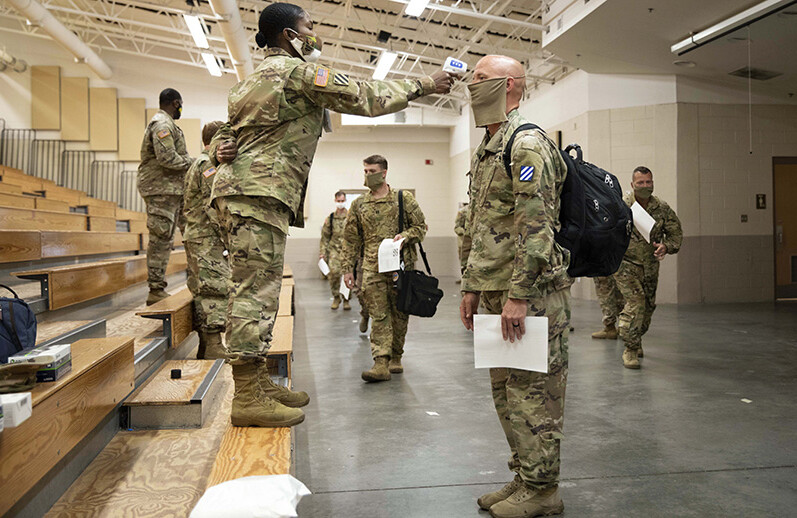On July 27, U.S. Naval War College's Professor Derek S. Reveron took part in a Carnegie Council webinar on human security and national security, moderated by Senior Fellow Nikolas Gvosdev. This post follows up on some queries that were posed during the discussion. For more, check out Reveron's book, co-authored with Kathleen Mahoney-Norris, Human and National Security: Understanding Transnational Challenges.
First, we do not see human and national security as mutually exclusive. They often are presented in that way, but we did our best to show how the two are interdependent and why national security cannot exist without human security. National security thinkers tend to focus on catastrophic nuclear attack as an existential threat (it is), but they ignore how climate change, disease, and contestations over identity are also existential threats to society. The latter gets overlooked for cultural reasons in the U.S., but also the national security system fares poorly with slow-moving calamities like climate change. It’s much easier to convene a Situation Room meeting in response to a crisis like a country invading another or a major terrorist attack.
In the United States, human security is often treated as a foreign policy matter that is implemented by U.S. Agency for International Development through its programs that address food scarcity or U.S. Department of State through its programs that address public health. Within the U.S., human security issues such as poverty, literacy, and health are addressed by state governments, non-governmental organizations, and the private sector. Yet, the global pandemic of severe acute respiratory syndrome coronavirus 2 (SARS-CoV-2 or COVID-19) illustrates there is an urgency to improve public health inside the United States and consider how the pandemic undermines U.S. national security through loss of life, economic decline, and loss of credibility. The national government seems better at addressing a pandemic 8,000 miles away rather than within U.S. borders. We explored this more deeply in our book by discussing health security.
It is likely due to our military background that some participants thought we are arguing for a greater role for militaries, but we do not see prominent roles for militaries in addressing human security deficits. In the U.S., some in the military think about this since as a U.S. Special Operations Command White Paper noted: "We struggle when dealing with challenges not fitting neatly into our traditional models." We adopted a broader concept of national security that is beyond traditional defense issues. Militaries are widely used around the world for domestic relief efforts, but they tend to be used that way since they are a large standing government-controlled work force and often used as an insurance policy that gets collateralized to borrow against to use a metaphor. In the absence of peacekeeping or warfighting, governments such as Brazil, Chile, and South Africa use their militaries' planning and logistical capabilities to assist during domestic emergencies brought by natural disasters, civil disturbances, and pandemics. Militaries have capabilities that can be used, but it is often more expensive and less efficient than civilian agencies working in partnership with the private sector. Further, using the military in social work has important implications for both those in uniform and society at large. To use a platitude (sorry), we need to re-balance the portfolio of national security where the military as a tool of foreign policy dominates federal spending.
As the concept of human security gets incorporated more into national thinking, there are a number of alternatives to see how this would work in practice. First, the United Nations frameworks are important starting points. Second, countries such as Germany and Canada have much more balanced approaches to national security. Canada's national security policy used a wonderful graphic to illustrate the inter-related nature of human and national security to include defining the various levels of governments' roles in that construct. Finally, philanthropic and other civil society organizations like Carnegie Council are very active in this space and should be examined for innovations and ways to use government financing to scale-up programs. After all, we are talking about ways to improve other human beings' lives regardless of gender, nationality or identity if they did not win the ovarian lottery to paraphrase Warren Buffet.
Derek Reveron is the chair of the National Security Affairs Department at the Naval War College and a lecturer in extension and faculty affiliate at the Belfer Center for Science and International Affairs at Harvard University. The views expressed are his own and do not reflect the positions of the U.S. Naval War College, the U.S. Navy, or the United States Government.



